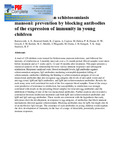| dc.description.abstract | A total of 129 children were treated for Schistosoma mansoni infections, and followed for intensity of reinfection at 3-monthly intervals over a 21-month period. Blood samples were taken before treatment and at 5 weeks and 6, 12 and 18 months after treatment. This paper presents a statistical analysis of the relationship between various immune responses and subsequent reinfection. Responses analysed were: blood eosinophil levels; IgE antibodies against schistosomulum antigens; IgG antibodies mediating eosinophil-dependent killing of schistosomula; antibodies inhibiting the binding to schistosomulum antigens of two rat monoclonal antibodies that also recognize egg antigens; the levels of anti-adult worm and of anti-egg (total, IgM and IgG) antibodies; and IgM anti-schistosomulum antibodies. Results for each assay were well correlated for each of the five separate blood samples. None of the assays were predictive of resistance to reinfection, but susceptibility to reinfection was strongly correlated with results in the preceding blood samples for total anti-egg antibodies and the inhibition of binding of one of the two monoclonal antibodies. Further analysis also revealed a correlation between reinfection intensities and both IgM anti-schistosomulum antibodies and IgM and IgG anti-egg antibodies. These results are consistent with the hypothesis that early infections elicit the development, in response to egg antigens, of antibodies that block immune mechanisms directed against schistosomula. Blocking antibodies may be IgM, but might also be of an ineffective IgG isotype. The existence of such antibodies in young children would explain the slow development of immunity in the face of a range of detectable, potentially protective immune responses. | en |

